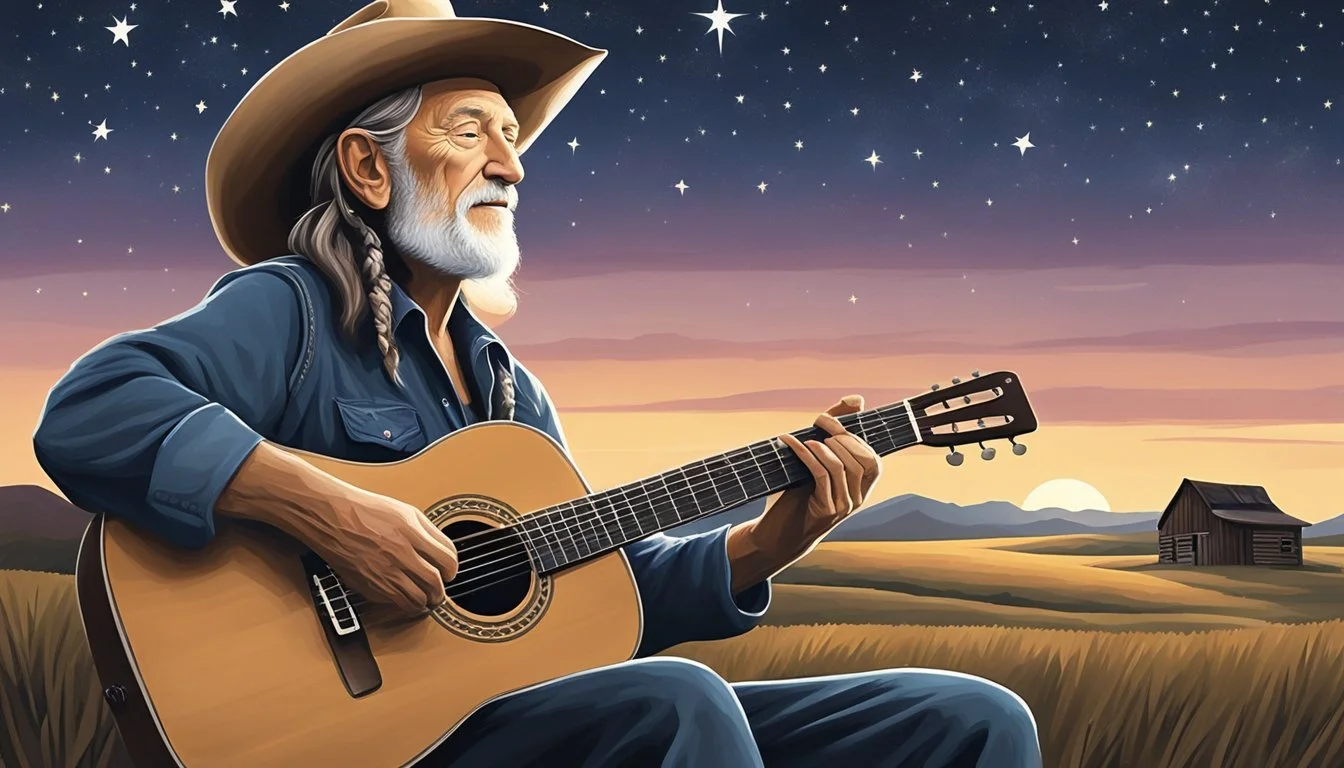Willie Nelson's Popular Songs: The Hits That Defined Country Music History!
Willie Nelson's iconic voice and songwriting have made him a cornerstone of country music for decades. His catalog spans countless hits that have resonated with fans across generations. Nelson's most popular songs include timeless classics like "On the Road Again," "Always on My Mind," and "Blue Eyes Crying in the Rain."
The country legend's diverse musical style incorporates elements of outlaw country, traditional pop, jazz, and folk. This versatility has allowed Nelson to collaborate with artists across genres and maintain relevance throughout his lengthy career. His songs often feature introspective lyrics, memorable melodies, and his distinctive vocal phrasing.
Many of Willie Nelson's most beloved tracks showcase his storytelling abilities and emotional depth. Songs like "Crazy," which became a massive hit for Patsy Cline, and "Angel Flying Too Close to the Ground" demonstrate his skill at crafting poignant narratives. Nelson's enduring popularity is a testament to the universal appeal and lasting impact of his music.
Early Life and Musical Origins
Willie Nelson's journey as a country music icon began in Abbott, Texas, where he was born on April 29, 1933. His early exposure to music and rural life shaped his distinctive style and songwriting abilities.
Influences and Early Career
Nelson's grandparents, who raised him, introduced him to music at a young age. He received his first guitar at six and wrote his first song at seven. By nine, he was performing in a local band.
Gospel music played a significant role in Nelson's musical development. His song "Family Bible" reflects this early influence. Nelson's talent for songwriting emerged quickly, and he began selling his compositions while still a teenager.
In his late teens, Nelson joined the Air Force but was discharged due to back problems. He then worked as a DJ at various radio stations, honing his musical skills and expanding his knowledge of country music.
Songwriting Breakthrough
Nelson's move to Nashville in 1960 marked a turning point in his career. He quickly gained recognition as a talented songwriter, penning hits for established artists. "Hello Walls," recorded by Faron Young, became a number-one hit in 1961.
"Crazy," originally written for Billy Walker, became one of Nelson's most famous compositions when Patsy Cline recorded it in 1961. The song's success established Nelson as a premier songwriter in the country music scene.
Ray Price recorded Nelson's "Night Life" in 1963, further cementing Nelson's reputation. These early songwriting successes laid the foundation for Nelson's future as a performer and country music legend.
Rise to Fame
Willie Nelson's ascent to stardom was marked by his distinctive sound and rebellious spirit. He played a pivotal role in shaping country music's landscape and gained widespread recognition for his songwriting prowess.
Outlaw Country Movement
In the 1970s, Willie Nelson became a key figure in the Outlaw Country movement. This genre rejected the polished Nashville sound, embracing a rawer, more authentic style. Nelson's unconventional approach and refusal to conform to industry standards set him apart.
His 1975 album "Red Headed Stranger" was a turning point. The concept album's stripped-down production and narrative storytelling defied commercial expectations but resonated deeply with listeners. It became a massive hit, solidifying Nelson's status as an outlaw country icon.
Critical Acclaim and Commercial Success
Nelson's artistic risk-taking paid off handsomely. "Blue Eyes Crying in the Rain," a track from "Red Headed Stranger," became his first number-one hit as a singer. The song's success introduced Nelson to a broader audience and earned him his first Grammy Award.
His popularity continued to soar with the release of "On the Road Again" in 1980. This instantly recognizable tune became one of his signature songs and a cultural touchstone. It won Nelson another Grammy and further cemented his place in music history.
Nelson's unique vocal style, poignant lyrics, and cross-genre appeal attracted fans from country, rock, and pop. His ability to craft memorable melodies and tell compelling stories through song ensured his enduring influence on American music.
Iconic Albums and Hits
Willie Nelson's discography spans decades, featuring groundbreaking albums and chart-topping singles that have cemented his status as a country music legend. His distinctive voice and innovative approach to songwriting have produced timeless classics across various genres.
Stardust and American Songbook
"Stardust," released in 1978, marked a pivotal moment in Willie Nelson's career. This album showcased his versatility by reimagining pop standards from the Great American Songbook. Nelson's rendition of "Georgia on My Mind" became an instant classic, earning him a Grammy Award.
The album's success was unprecedented, spending two years on the Billboard Country Albums chart. Nelson's interpretations of "Blue Skies" and "All of Me" demonstrated his ability to transcend genre boundaries, appealing to both country and pop audiences.
Collaborations and Duets
Willie Nelson's collaborations have produced some of country music's most memorable duets. His partnership with Waylon Jennings yielded hits like "Good Hearted Woman" and the album "Wanted! The Outlaws," which became the first country album to achieve platinum status.
Nelson's duet with Merle Haggard, "Pancho and Lefty," topped the charts in 1983. The song's narrative style and the artists' complementary voices created a country classic. Nelson also recorded successful duets with Kris Kristofferson and Ray Charles, expanding his musical reach.
Latter-Day Releases
In his later career, Willie Nelson continued to release critically acclaimed albums. "Spirit" (1996) showcased his songwriting prowess with introspective tracks. The album "Last Man Standing" (2018) featured Nelson's reflections on mortality and friendship.
"Ride Me Back Home" (2019) earned Nelson a Grammy for Best Country Solo Performance. His 2022 release, "A Beautiful Time," demonstrated his enduring creativity at 89 years old. These albums prove Nelson's ability to remain relevant and innovative throughout his extensive career.
Musical Style and Influence
Willie Nelson's unique musical style blends country, rock, and folk elements, creating a sound that defies easy categorization. His innovative approach has left an indelible mark on American music.
Cross-Genre Collaborations
Willie Nelson's ability to cross musical boundaries has led to collaborations with artists from diverse genres. He's recorded duets with rock icons, jazz musicians, and pop stars. His work with Waylon Jennings helped define the Outlaw Country movement, pushing against Nashville's polished sound.
Nelson's ventures into rock and bluegrass showcase his versatility. He's performed with Bob Dylan and recorded an album of Gershwin standards. These collaborations have expanded his audience and cemented his status as a musical innovator.
Songwriting Craft
Nelson's songwriting has been the cornerstone of his enduring success. His lyrics often explore themes of love, loss, and the human experience. Songs like "Funny How Time Slips Away" demonstrate his ability to capture complex emotions in simple, relatable terms.
His narrative style shines in tracks like "My Heroes Have Always Been Cowboys," painting vivid pictures of American life. Nelson's compositions blend storytelling with memorable melodies, creating songs that resonate across generations. His writing has influenced countless artists in country music and beyond.
Legacy and Impact
Willie Nelson's influence extends far beyond his musical accomplishments. His artistry and activism have left an indelible mark on American culture.
Awards and Honors
Willie Nelson's musical prowess has earned him numerous accolades. He has won multiple Grammy Awards, including recognition for his iconic album "Stardust" and his duet "On the Road Again." The Country Music Association has honored Nelson with several awards, cementing his status as a country music legend.
Nelson's induction into the Country Music Hall of Fame in 1993 acknowledged his significant contributions to the genre. He also received the prestigious Kennedy Center Honors in 1998, celebrating his lifetime achievements in the performing arts.
Mentorship and Social Impact
Nelson's impact reaches beyond his personal achievements. He co-founded Farm Aid in 1985, an organization that supports family farmers and promotes sustainable agriculture. This initiative has raised millions of dollars and awareness for rural communities.
As a member of the Highwaymen supergroup, Nelson collaborated with fellow country icons, influencing a new generation of musicians. His song "Family Bible" showcased his songwriting talents early in his career and became a gospel standard.
Nelson's advocacy for marijuana legalization has made him a symbol of counterculture. His openness about cannabis use has sparked conversations about drug policy reform across the United States.
Contributions Beyond Music
Willie Nelson's impact extends far beyond his musical achievements. His philanthropic efforts and artistic ventures in film and literature have left an enduring mark on American culture.
Philanthropy and Activism
Willie Nelson co-founded Farm Aid in 1985, an annual benefit concert supporting family farmers. The organization has raised over $60 million to promote a strong, family farm-centered system of agriculture in America.
Nelson is a vocal advocate for environmental causes and sustainable fuel alternatives. He launched BioWillie, a brand of biodiesel made from vegetable oil.
The country legend supports various charitable organizations, including the Hillcrest Youth Ranch for troubled boys and the Animal Welfare Institute.
Film and Literature
Nelson made his acting debut in "The Electric Horseman" (1979) alongside Robert Redford and Jane Fonda. His natural charisma translated well to the big screen.
He has appeared in over 30 films and television shows, including "Honeysuckle Rose" and "Barbarosa."
Nelson has authored several books, including his autobiography "It's a Long Story: My Life" and the novel "A Tale Out of Luck."
His song "Whiskey River" became the opening number for his live shows and a recurring theme in his literary works.






